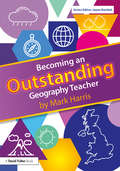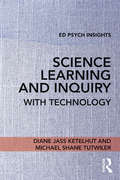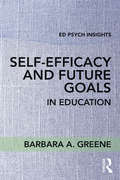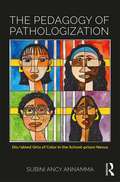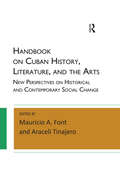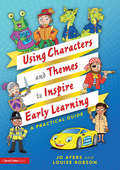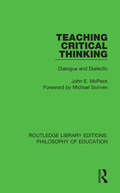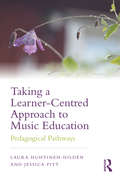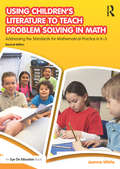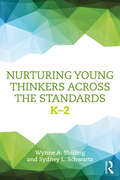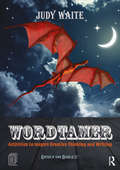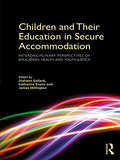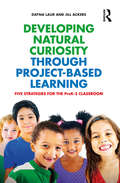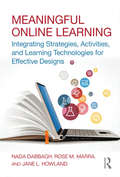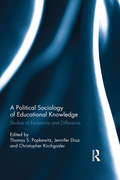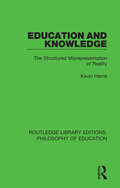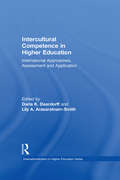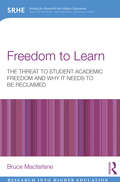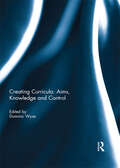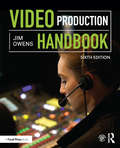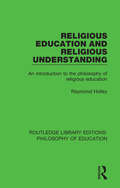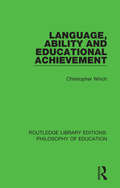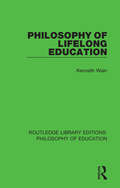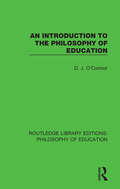- Table View
- List View
Becoming an Outstanding Geography Teacher (Becoming an Outstanding Teacher)
by Mark HarrisBecoming an Outstanding Geography Teacher supports all geography teachers in offering a wide range of approaches to teaching and learning that will stimulate and engage students. Providing a variety of techniques for planning inspiring geography lessons, the book shows teachers how they can use current resources in a more innovative way to produce outstanding results. Chapters include sample lesson plans which demonstrate each technique with a step-by-step discussion of the development of the lessons, and have a strong focus on activating learning and supporting pupils on their individual learning journeys. The book covers all aspects of geography teaching, including: designing programmes of study differentiation questioning literacy and numeracy teaching A Level enquiry geography feedback and assessment. Packed full of strategies and activities that are easy to implement, Becoming an Outstanding Geography Teacher is essential reading for newly qualified and experienced geography teachers who want to ensure outstanding teaching and learning in their classrooms.
Science Learning and Inquiry with Technology (Ed Psych Insights)
by Diane Jass Ketelhut Michael Shane TutwilerWhen implemented effectively, technology has great potential to positively connect with learning, assessment, and motivation in the context of K–12 science education and inquiry. Written by leading experts on technology-enhanced science learning and educational research, this book situates the topic within the broader context of educational psychology research and theory and brings it to a wider audience. With chapters on the fundamentals of science learning and assessment, integration of technology into classrooms, and examples of specific technologies, this concise volume is designed for any course on science learning that includes technology use in the curriculum. It will be indispensable for student researchers and both pre- and in-service teachers alike.
Self-Efficacy and Future Goals in Education (Ed Psych Insights)
by Barbara A. GreeneAs the inner resource that drives us to pursue activities, to put forth effort, and to avoid failure, motivation is key to overall well-being. Self-efficacy and future goals are important to understanding and reinforcing the motivation to learn, especially for students in classroom settings. Written by a leading expert on motivation, this book situates the topic within the broader context of educational psychology research and theory, and brings it to a wider audience. With chapters on the fundamentals of self-efficacy and future goals, their importance for student learning, and how to develop them in educational settings, this concise volume is designed for any education course that includes student motivation in the curriculum. It will be indispensible for student researchers and both pre- and in-service teachers alike.
The Pedagogy of Pathologization: Dis/abled Girls of Color in the School-prison Nexus
by Subini Ancy AnnammaWINNER OF THE 2018 NATIONAL WOMEN'S STUDIES ASSOCIATION ALISON PIEPMEIER BOOK PRIZE Linking powerful first-person narratives with structural analysis, The Pedagogy of Pathologization explores the construction of criminal identities in schools via the intersections of race, disability, and gender. amid the prevalence of targeted mass incarceration. Focusing uniquely on the pathologization of female students of color, whose voices are frequently engulfed by labels of deviance and disability, a distinct and underrepresented experience of the school-to-prison pipeline is detailed through original qualitative methods rooted in authentic narratives. The book’s DisCrit framework, grounded in interdisciplinary research, draws on scholarship from critical race theory, disability studies, education, women’s and girl’s studies, legal studies, and more.
Handbook on Cuban History, Literature, and the Arts: New Perspectives on Historical and Contemporary Social Change
by Araceli Tinajero Mauricio A. FontFirst Published in 2016. Routledge is an imprint of Taylor & Francis, an Informa company.
Using Characters and Themes to Inspire Early Learning: A Practical Guide
by Jo Ayers Louise RobsonOffering an approach that is tried, tested and proven to work, this book supports practitioners in planning and resourcing a series of topics based around popular themes and interests in the early years. Each topic is open-ended and introduced in the form of a problem that the children have to solve and can be led by their knowledge, thoughts and ideas. Using Characters and Themes to Inspire Early Learning aims to nurture children’s natural curiosity and imagination, encouraging them to become the facilitators who are empowered to solve problems, explore solutions and take ownership of their learning. There are links throughout to the seven areas of learning in the EYFS and practical guidance on how to document the children’s learning. Features include: An exciting range of characters, themes and objects to inspire children. Photocopiable pages and online resources to use in the classroom. Session breakdowns to set the scene and make planning easy. Creative ideas and activities to prompt children’s thinking and develop discussions. Packed with ideas for extending learning and practical resources that can be printed out for use in the classroom, this book is essential reading for all students and practitioners who want to provide inspiring learning opportunities for the children in their care.
Teaching Critical Thinking: Dialogue and Dialectic (Routledge Library Editions: Philosophy of Education #13)
by John E. McPeckThis book, first published in 1990, takes a critical look at the major assumptions which support critical thinking programs and discovers many unresolved questions which threaten their viability. John McPeck argues that some of these assumptions are incoherent or run counter to common sense, while others are unsupported by the available empirical evidence. This title will be of interest to students of the philosophy of education.
Taking a Learner-Centred Approach to Music Education: Pedagogical Pathways
by Laura Huhtinen-Hildén Jessica PittAdopting a fresh approach to the assumptions and concepts which underlie musical learning, Taking a Learner-Centred Approach to Music Education provides comprehensive guidance on professional and pedagogical aspects of learner-centred practice. This essential companion offers a pedagogy which is at once informed by theoretical understandings, and is underpinned by experience, practical examples, case studies and self-reflection. Initial chapters explore the theoretical dimensions of learner-centred music education, touching on aspects including collaborative learning, the learning environment and pedagogical sensitivity. Latter chapters delve deeper into the practical application of these teaching strategies and methods. The book invites its reader to reflect on topics including: music, emotions and interaction the voice and body as instruments making music visible and tangible improvising and learning music with instruments working with groups in creative activities the music pedagogue as a sensitive and creative instrument. Taking a Learner-Centred Approach to Music Education will deepen understanding, facilitate reflection and inspire new approaches to teaching in the field of music. It is essential reading for current and future practitioners involved in music education, early childhood music practice, community music, music therapy and special needs education.
Using Children's Literature to Teach Problem Solving in Math: Addressing the Standards for Mathematical Practice in K–5
by Jeanne WhiteLearn how children’s literature can help K–5 students see the real-life applications of mathematical concepts. This user-friendly book shows how to use stories to engage students in building critical reasoning, abstract thinking, and communication skills, all while helping students understand the relevance of math in their everyday lives. Each chapter is dedicated to one of the eight Standards for Mathematical Practice, and offers examples of children’s literature that can be used to help students develop that practice. You’ll find out how to: Encourage students to persevere in solving mathematical problems and use multiple approaches to find the answer; Help students reason abstractly with the aid of concrete objects and visuals; Guide students in constructing arguments to explain their reasoning and engage in critical discussion with their peers; Teach students to recognize mathematical patterns and use them to solve problems efficiently; And more! The book offers activities for beginners as well as for more advanced problem solvers. Each chapter also provides guidance for ELLs and students with special needs, so no matter your classroom environment, you’ll be able to use these strategies to make math class more dynamic, engaging, and fun.
Nurturing Young Thinkers Across the Standards: K–2
by Wynne A. Shilling Sydney L. SchwartzNurturing Young Thinkers Across the Standards: K–2 provides multiple practical resources to assist teachers in working with standards across subject areas in ways that bring critical thinking into the everyday process of learning content and skills. The authors provide suggestions for engaging and sustaining children’s interest and illustrate the use of teaching language that actively nurtures the habits of lifelong learning. The book is rich with opportunities for developing tools for design, implementation, and assessment of vibrant integrated curricula for K–2 students that support the development of cognitive skills and increase confidence in their abilities to think and learn.
Wordtamer: Activities to Inspire Creative Thinking and Writing
by Judy WaiteImagine a funfair in the classroom... invite dragons to school…let pupils travel through time! Written by award-winning children’s author Judy Waite, Wordtamer offers over fifty ideas for exciting, innovative writing activities and creative workshops. The book explores how authors actually work and what they achieve through their methods. It considers how teachers and children can incorporate these techniques into their own work, and so improve creative writing. Wordtamer provides easy-to-follow instructions to: set up and run inspiring writing lessons and workshops cover basic elements such as character and setting identify craft skills that link writing with the school curriculum develop ideas into contemporary, science fiction, fantasy or time-travel scenarios using tried-and-tested templates that expand on core concepts engage reluctant writers by using visual and kinaesthetic approaches develop independent and group-work practice enrich creative practice and awareness explore different writing styles improve teaching styles and children’s writing through a range of innovative and interactive activities appreciate why, as well as how, these techniques are so effective. Underpinned by theory and Judy’s own experience of working as an author in schools and running writing workshops for all ages, Wordtamer offers step-by-step, inspiring plans for creative writing lessons that will make a buzz in the classroom. Pupils won’t just create characters…they will become them.
Students, Places and Identities in English and the Arts: Creative Spaces in Education (National Association for the Teaching of English (NATE))
by David Stevens Karen LockneyIn an age when national identities are a subject of popular debate, along with issues of place in relation to immigration, displacement and mobility, it is particularly important that educators are supported in their reflections on how best to respond to such pertinent issues in their daily practice. This book accessibly and sensitively explores the ways in which teachers can work with places and identities in English and related expressive arts to create a rich experience for students in schools and beyond. A team of carefully selected contributors present practical ideas and critically examine diverse contexts and viewpoints. Exploring the significance of identity and place in education, the central notion is that language and arts are vital to enhancing understanding and empathy. The book provides an approach that offers teachers and other professionals ways to engage critically with these themes, as well as practical strategies for opening up debate and creative work in a broad range of curriculum areas. This insightful book will be of interest to teachers, teacher educators, training teachers and researchers in education.
Children and Their Education in Secure Accommodation: Interdisciplinary Perspectives of Education, Health and Youth Justice
by Diahann Gallard Katharine Evans James MillingtonThis highly topical book integrates theory and practice about children and their education provision in secure accommodation. Bridging the fields of education, health, and youth justice, it provides a unique interdisciplinary perspective outlining the importance of taking a holistic approach to the education and rehabilitation of children who are ‘locked up’. The book has brought together contributors from across the UK and beyond to share their academic research, practical knowledge, and experiences working with children and young people. Shedding light on the intricacies and realities of working in the context of secure settings, the book is divided into the following five parts: Contextualising the field Practice insights Case examples and models of practice Inclusion and voice Recommendations from research Children and Their Education in Secure Accommodation unravels the complexity of the topic and offers ‘whole-system’ perspectives, as well as a child-centred view, on the issue of educating and rehabilitating children and the needs and rights of children in such settings. With unique and valuable insights from those involved in policy or provision, this book will be an essential text for researchers, practitioners, and students in this interdisciplinary field.
Developing Natural Curiosity through Project-Based Learning: Five Strategies for the PreK–3 Classroom
by Dayna Laur Jill AckersDeveloping Natural Curiosity through Project-Based Learning is a practical guide that provides step-by-step instructions for PreK–3 teachers interested in embedding project-based learning (PBL) into their daily classroom routine. The book spells out the five steps teachers can use to create authentic PBL challenges for their learners and illustrates exactly what that looks like in an early childhood classroom. Authentic project-based learning experiences engage children in the mastery of twenty-first-century skills and state standards to empower them as learners, making an understanding of PBL vital for PreK–3 teachers everywhere.
Meaningful Online Learning: Integrating Strategies, Activities, and Learning Technologies for Effective Designs
by Nada Dabbagh Jane L. Howland Rose M. MarraMeaningful Online Learning explores the design and facilitation of high-quality online learning experiences and outcomes through the integration of theory-based instructional strategies, learning activities, and proven educational technologies. Building on the authors’ years of synthesized research and expertise, this textbook prepares instructors in training to create, deliver, and evaluate learner-centered online pedagogies. Pre- and in-service K–12 teachers, higher education faculty, and instructional designers in private, corporate, or government settings will find a comprehensive approach and support system for their design efforts.
A Political Sociology of Educational Knowledge: Studies of Exclusions and Difference
by Thomas A. Popkewitz Jennifer Diaz Christopher KirchgaslerBringing together the sociology of knowledge, cultural studies, and post-foundational and historical approaches, this book asks what schooling does, and what are its limits and dangers. The focus is on how the systems of reason that govern schooling embody historically generated rules and standards about what is talked about, thought, and acted on; about the "nature" of children; about the practices and paradoxes of educational reform. These systems of reason are examined to consider issues of power, the political, and social exclusion. The transnational perspectives interrelate historical and ethnographic studies of the modern school to explore how curriculum is translated through social and cognitive psychologies that make up the subjects of schooling, and how educational sciences "act" to order and divide what is deemed possible to think and do. The central argument is that taken-for-granted notions of educational change and research paradoxically produce differences that simultaneously include and exclude.
Education and Knowledge: The Structured Misrepresentation of Reality (Routledge Library Editions: Philosophy of Education #9)
by Kevin HarrisIn this book, first published in 1979, Kevin Harris explores the idea that in capitalist liberal democracies formal education functions essentially not to reveal reality, but rather to transmit to each new generation a structured misrepresentation of reality. In defence of this controversial and thought-provoking view, the author argues that all knowledge of the world is theory-laden and that a neutral, detached, objective description of the world is impossible. This title will be of interest to students of the philosophy of education.
Intercultural Competence in Higher Education: International Approaches, Assessment and Application (Internationalization in Higher Education Series)
by Darla K. Deardorff Lily A. Arasaratnam-SmithIntercultural Competence in Higher Education features the work of scholars and international education practitioners in understanding the learning outcomes of internationalization, moving beyond rhetoric to concrete practice around the world. Devoted exclusively to exploring the central learning outcomes of internationalization efforts, this edited volume contains a refreshing combination of chapters and case studies from interdisciplinary and cross-cultural contributors, including: cutting-edge issues within intercultural competence development, such as intersectionality, mapping intercultural competence, and assessment; the role of higher education in developing intercultural competence for peacebuilding in the aftermath of violent conflict; facilitating intercultural competence through international student internships; interdisciplinary and cross-cultural contributions from over 19 countries including Japan, Russia, Serbia, South Africa, and Vietnam; the latest research and thinking on global, intercultural, and international learning outcomes, with a unique emphasis on newer voices. Intercultural competence has become an essential element in international as well as domestic education. This text provides the latest thinking and research within the context of internationalization, presents practical case studies on how to integrate this into the preparation of global-ready students and will be of interest to postgraduate students, international education administrators, and practitioners, as well as scholars and researchers in a variety of disciplines who have an interest in intercultural and global competence.
Freedom to Learn: The threat to student academic freedom and why it needs to be reclaimed (Research into Higher Education)
by Bruce MacfarlaneThe freedom of students to learn at university is being eroded by a performative culture that fails to respect their rights to engage and develop as autonomous adults. Instead, students are being restricted in how they learn, when they learn and what they learn by the so-called student engagement movement. Compulsory attendance registers, class contribution grading, group project work and reflective learning exercises based on expectations of self-disclosure and confession take little account of the rights of students or individual differences between them. This new hidden university curriculum is intolerant of students who may prefer to learn informally, are reticent, shy, or simply value their privacy. Three forms of student performativity have arisen - bodily, participative and emotional – which threaten the freedom to learn. Key themes include: A re-imagining of student academic freedom The democratic student experience Challenging assumptions of the student engagement movement An examination of university policies and practices Freedom to Learn offers a radically new perspective on academic freedom from a student rights standpoint. It analyzes the effects of performative expectations on students drawing on the distinction between negative and positive rights to re-frame student academic freedom. It argues that students need to be thought of as scholars with rights and that the phrase ‘student-centred’ learning needs to be reclaimed to reflect its original intention to allow students to develop as persons. Student rights – to non-indoctrination, reticence, in choosing how to learn, and in being treated like an adult – ought to be central to this process in fostering a democratic rather authoritarian culture of learning and teaching at university. Written for an international readership, this book will be of great interest to anyone involved in higher education, policy and practice drawing on a wide range of historical and contemporary literature related to sociology, philosophy and higher education studies.
Creating Curricula: Aims, Knowledge and Control
by Dominic WyseKnowledge has been a defining focus for the curriculum studies field. In the early part of the 21st century convincing arguments were mounted that knowledge needed to be ‘brought back in’, both to the curriculum of schools and to the attention of curriculum researchers. This book is a result of these arguments, and what some regarded as a ‘crisis’ in curriculum study related to the growing emphasis on international comparisons between education systems. The book’s most important contribution is to build on seminal work in the sociology and philosophy of education in order to develop new foundations for curriculum study, using the importance of ‘transactions’ as the context for understanding knowledge in the curriculum. The contributors build on this importance to suggest a rapprochement in the field around the idea of curriculum knowledge as both constructed and real. This book was originally published as a special issue of The Curriculum Journal.
Video Production Handbook
by Jim OwensTechniques matter! Great ideas don't automatically translate into great programs. It's not enough simply to show what is going on. The way you present your subject will influence how your audience responds. You need to choose your picture and sound carefully, to convey your ideas in an interesting, persuasive way. This book will show you how. Video Production Handbook shows the full production process, from inception of idea to final distribution. The book focuses especially on why each step occurs as it does and provides guidance in choosing the simplest methods of creating the shots you want in your video project. Concentrating on the techniques and concepts behind the latest equipment, this book demonstrates the fundamental principles needed to create good video content on any kind of budget. Suitable for students and beginning videographers, the new edition of this classic text retains its clarity and directness but has been completely revised and updated. This practical sourcebook has been specially prepared to give you an at-a-glance guide to quality video program-making on a modest budget. Emphasis throughout is on excellence with economy; whether you are working alone or with a small multi-camera group. The well-tried techniques detailed here will steer you through the hazards of production, helping you to avoid those frustrating, time-wasting problems, and to create an effective video program. For many years Video Production Handbook has helped students and program-makers in a wide range of organizations. Now in its thoroughly revised 4th edition, Video Production Handbook guides you step-by-step, explaining how to develop your initial program ideas and build them into a successful working format. It covers the techniques of persuasive camerawork, successful lighting and sound treatment, and video editing. You will find straightforward up-to-the-minute guidance with your daily production problems, and a wealth of practical tips based on the authors' personal experiences. * Highly visual: hundreds of full-color illustrations demonstrate techniques * Modern: Up-to-date information on current equipment, techniques, and new distribution outlets such as the Web and mobile phones * Balanced: Production techniques are covered in detail, but ideas and creative problem solving are given equal weight * A complete resource: Detailed teaching ancillaries are available for instructors
Religious Education and Religious Understanding: An Introduction to the Philosophy of Religious Education (Routledge Library Editions: Philosophy of Education #10)
by Raymond HolleyThis book, first published in 1978, introduces readers to the topic of the philosophy of religious education in a way which demands little philosophical expertise on their part. It puts forward a particular theory of religious education in such a way that most of the major questions are faced and sufficient answers given to enable readers to examine the theory critically, and so further the development of philosophy and education.
Language, Ability and Educational Achievement (Routledge Library Editions: Philosophy of Education #20)
by Christopher WinchThis title, first published in 1990, engages in the current debates about the teaching of literacy and the reform of education. Based on his dissatisfaction with prevalent theories of educational achievement and his experience of teaching in elementary schools, Winch argues that the dichotomy of biological inheritance and environmental influence is inadequate to describe the diverse phenomena of educational achievement. This title will be of interest to students of the philosophy of education.
Philosophy of Lifelong Education (Routledge Library Editions: Philosophy of Education #19)
by Kenneth WainThis book, first published in 1987, provides a rigorous philosophical analysis of lifelong education. The author presents his arguments simply and directly so that the book is accessible to students who are new to philosophy and adult education.
An Introduction to the Philosophy of Education (Routledge Library Editions: Philosophy of Education #14)
by D. J. O'ConnorEducation, like every other important branch of knowledge, has its underlying philosophical problems. It is these problems and the attempts to solve them which together make up the philosophy of education. This book, first published in 1957, provides a simple explanation and illustration of what philosophy can (and cannot) do for educational thinking. This title will be of interest to students of the philosophy of education.
